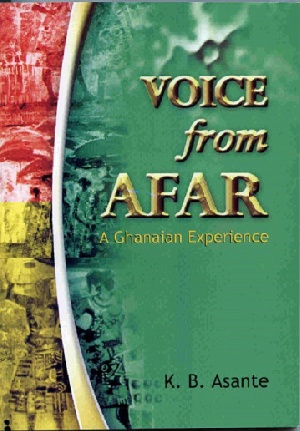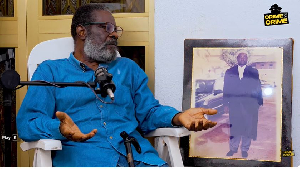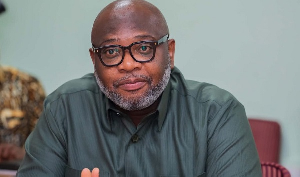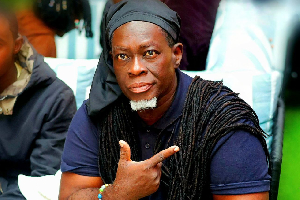[Introduction: It gets lonely on Mondays these days with the loss of a great mentor and vocal advocate of all that is good for Ghana. I’ve been too accustomed to reading K.B. Asante’s columns on Monday mornings on the editorial page of the Daily Graphic when this column too appears. Now I have to make the emotional adjustments to the fact that the great mentor has finally been called to his village, and we’re now on our own. Today’s column is a revisit of a review (published June 9, 2004) when K.B. Asante’s book, Voice from Afar, first appeared.]
The influences
Familiar strands run through Edmund Burke, George Bernard Shaw, Aneurin Bevin, George Padmore, and Kwame Nkrumah. Certainly, this intellectual quintet belonged to a class of eloquent activists and inspired writers. They have influenced many including Mr Kwaku Baprui Asante. The snatches of spirit – in the medley of Pan-African, socialist, and democratic undertones – showed in Mr Asante’s intellectual choices.
Indeed, any of the following titles – Observations on the Present State of the Nation (Burke), Too True to be Good (Bernard Shaw), In Place of Fear (Bevin), Birth Pains of Black Nationhood (Padmore), or Class Struggle (Nkrumah) – could be fitting sub-titles for Mr Asante’s book “Voice from Afar: A Ghanaian Experience”.
The book is a 192-page anthology of 52 selected articles published between 1994 and 2002, in Ghana’s Daily Graphic. Sporting a classy cover design by Amarkine Amartefio, the book captures Mr Asante’s sense of duty: that of putting an interpretative handle on Ghana’s fate and fortune for the understanding of his fellow countrymen, and women. The core of his work resonated similar challenges that stimulated the writings of the intellectual quintet in their respective periods.
Kwame Nkrumah
Among other urges, the author shared mostly Nkrumah’s sentiments for Africa’s economic and political freedom, and belief in the African. Said Mr Asante: “I never tire of recalling the faith Kwame Nkrumah had in Ghanaian doctors to build a medical school even though they had no previous experience of teaching in a medical school”. “You can do it,” Nkrumah assured Dr Charlie Easmon.
Mr Asante knew Nkrumah in the flesh. He served as the principal secretary of the African Affairs Secretariat from 1960 – 1966 at the Flagstaff House. A chapter, “Of ‘Hosannas’ and ‘Crucify Him’ ”, contain Mr Asante’s insights to Nkrumah about the peace mission to Hanoi – which spelled Nkrumah’s doom.
Asante’s optimism
Vice is needed if virtue is to stand a chance (so observed Machiavelli in 1513). To Mr Asante’s credit, his weekly columns contain faithful attempts to make the state safe. The pockets of optimism deep in Mr Asante’s veins are strong motivators. Besides, his conscience – elevated to a pedigree status via the esteemed influences – deserved release and use, lest they withered like raisins in the sun.
As the American, Henry David Thoreau, put it, “How vain it is to sit down to write when you have not stood up to live”. Mr Asante served as Ghana’s ambassador to Switzerland and Belgium, and high commissioner in London. He was secretary for Trade and Tourism in 1982, and for Education and Culture in 1988; and was involved in many OAU, Ecowas, Unctad, and Unido deliberations. In addition to receiving the Grand Medal (Order of the Volta), he was honoured by the University of Ghana with a doctorate in 1999.
The topics in the book are wieldy, but timely: the IMF/World Bank, the civil service, land sales, chieftaincy disputes, Ghana’s dwindling forests, population, energy, education, illiteracy, filth, environmental destruction, self-disrespect, intellectual laziness, poverty! He offers impressive illustrative details.
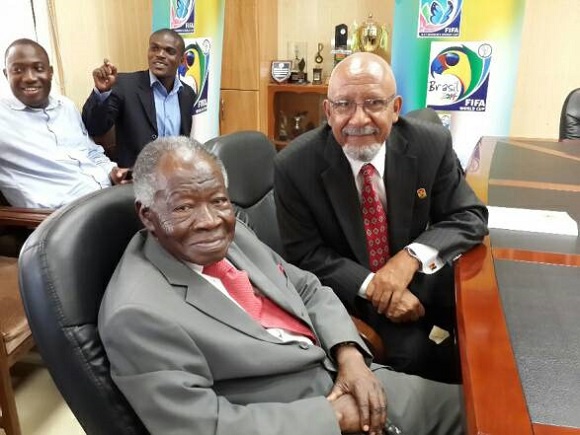
Anis Haffar with the late KB Asante
K.B. Asante quotes
Consider these “K. B. Asanteisms”: On work ethic: “Civil servants have learnt to do nothing unless directed because ‘if you do nothing, you do nothing wrong and you survive’ ”. On the IMF/World Bank: “The major economies ‘sin a little when it is in their interest to do so … We should not only listen to our benefactors but also observe what they do … our future lies (in) manufactures and not in more commodities’ ”.
On civic issues: “it is time for serious politics and not political promises that ‘would be bedtime infatuation or a lie’ ”. On self-knowledge: “If you compose your own obituary at 20, you have time to make sense of your life. Think about it”. On discipline: “we Ghanaians do not seem to like the discipline of working within rules, within a well-defined system”.
On scruples: “Fufu was put in the middle of sacks of rubber. Years later beer bottles were broken by some foreign companies to cripple Accra Brewery”. On sharing: “Today we tend to hide the food and wipe our mouth when a visitor approaches while we are eating, because we do not have enough”.
But often his inner self stands aghast at ugly obstacles that block progress and create horror: “We live in a world which does not look into the heart [but prefers] riotous living or yielding to desires and the base instincts … some old habits must die to make life better”.
Purposeful journalism
He has held the field of journalism, and raised the ante for professionalism by supplying fertile mines for mature study. Embodying the answers to a forward-looking society, his concerns and methods require continuity, and resolve. Such outlooks bridge distances between hope and fulfillment: “What is important is to have a purpose in life”, he counsels.
Mr Asante’s ear for the entertaining story and eye for the telltale detail score points. A number of committed readers welcome the no-nonsense, born-again kind of kinship with him. His ideals and ardent analysis are testimonies and give the assurance of a man who knows his own mind, with apologies to none. He stood a tall silhouette against the zone of professional journalism in Ghana.
(Email: anishaffar@gmail.com)
Opinions of Tuesday, 13 March 2018
Columnist: anishaffar.org

